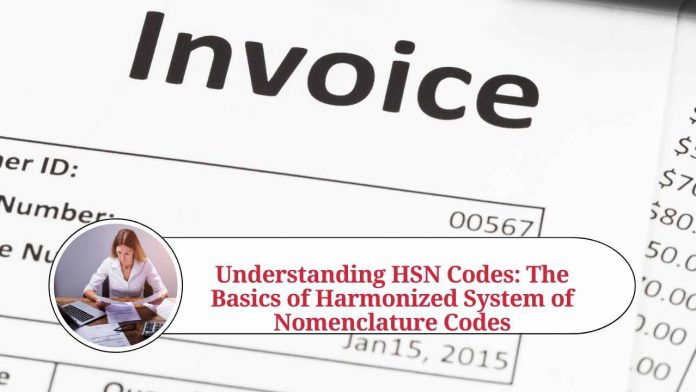Understanding HSN Codes and Their Importance in Invoicing
HSN codes, or Harmonized System of Nomenclature codes, are a standardized system of names and numbers used to classify goods in international trade. These codes are used to identify goods and products in invoices and other business documents, and play a crucial role in international trade.
In this blog, we will explore what HSN codes are, why they are important in invoicing, and how they can help businesses simplify their invoicing process.
What are HSN codes?
HSN codes are a standardized system of numbers and names that are used to classify goods and products in international trade. The codes are assigned to each product and provide a unique identification number that can be used to identify the product in invoices, shipping documents, and other business documents.
HSN codes are used by customs authorities to identify products for the purpose of assessing customs duties and taxes. The codes also help businesses to classify their goods and products for statistical and analytical purposes.
Why are HSN codes important in invoicing?
HSN codes play a crucial role in invoicing as they help businesses to accurately identify and classify their goods and products. This is particularly important when it comes to international trade, as customs authorities require businesses to provide accurate HSN codes on their invoices and shipping documents.
In addition to complying with customs regulations, HSN codes also help businesses to simplify their invoicing process. By using HSN codes, businesses can easily identify and categorize their goods and products, which makes it easier to create accurate and detailed invoices.
HSN codes also help to avoid errors and disputes that can arise from incorrect or incomplete product descriptions. By using HSN codes, businesses can provide a clear and standardized description of their products, which helps to eliminate confusion and ensure that all parties understand the nature of the transaction.
How to use HSN codes in invoicing?
Using HSN codes in invoicing is a relatively simple process. First, businesses need to identify the appropriate HSN code for each of their products. This can be done by consulting the HSN code list, which is available online.
Once the appropriate HSN code has been identified, it can be included in the invoice along with other details such as the product description, quantity, price, and total amount. It is important to ensure that the HSN code is accurate and matches the product being invoiced.
HSN codes were introduced in India as part of the Goods and Services Tax (GST) system, which came into effect in July 2017. Under the GST system, businesses are required to include HSN codes on their invoices for all goods and products sold.
The HSN code list in India is divided into 21 sections, with each section covering a specific category of goods. Each section is further divided into chapters, with each chapter covering a more specific category of goods. The HSN codes are then assigned to each individual product within a chapter.
In addition to helping businesses classify their products, HSN codes also play an important role in the GST system. The GST system uses HSN codes to determine the appropriate tax rate for each product. By using HSN codes on their invoices, businesses can ensure that they are charging the correct tax rate for each product and avoid penalties for incorrect tax calculations.
HSN codes also help businesses to track their sales and inventory. By using HSN codes, businesses can generate reports that provide detailed information about their sales and inventory by product category. This information can be used to identify trends and make informed decisions about inventory management and product pricing.
Conclusion
Overall, HSN codes are an essential tool for businesses engaged in international trade and those operating under the GST system in India. By accurately identifying and classifying their products using HSN codes, businesses can comply with customs regulations, simplify their invoicing process, and avoid errors and disputes that can arise from incorrect or incomplete product descriptions.
Read more useful content:
Frequently Asked Questions (FAQs)
What is an HSN code?
An HSN code, or Harmonized System of Nomenclature code, is a standardized system of names and numbers used to classify goods in international trade.
What is the purpose of HSN codes?
HSN codes are used to identify goods and products in invoices and other business documents, and play a crucial role in international trade. They help businesses to accurately identify and classify their goods and products, comply with customs regulations, and simplify the invoicing process.
How are HSN codes assigned?
HSN codes are assigned to each product and provide a unique identification number that can be used to identify the product in invoices, shipping documents, and other business documents. The codes are assigned based on the type and nature of the product.
What are the benefits of using HSN codes?
Using HSN codes can help businesses to simplify their invoicing process, comply with customs regulations, avoid errors and disputes, and track their sales and inventory by product category.
Are HSN codes mandatory?
In some countries, including India, HSN codes are mandatory for businesses that operate under the Goods and Services Tax (GST) system. However, even if HSN codes are not mandatory, using them can provide significant benefits to businesses engaged in international trade.
Where can I find the HSN code list?
The HSN code list is available online and can be accessed through various government and industry websites.
Can the same HSN code be used for different products?
No, each product must have its own unique HSN code. The HSN code is assigned based on the type and nature of the product, and products that are similar but not identical may have different HSN codes.
How do I determine the appropriate HSN code for my product?
To determine the appropriate HSN code for your product, you should consult the HSN code list and identify the chapter and heading that best describes your product. From there, you can identify the specific HSN code that corresponds to your product.
What happens if I use the wrong HSN code on my invoice?
Using the wrong HSN code on your invoice can result in customs delays, penalties, and disputes. It is important to ensure that the HSN code is accurate and matches the product being invoiced.
Can HSN codes be changed?
If there is a change in the nature or type of the product, the corresponding HSN code may need to be changed. However, businesses should ensure that any changes to HSN codes are made in compliance with customs regulations and do not result in incorrect tax calculations or penalties.




















